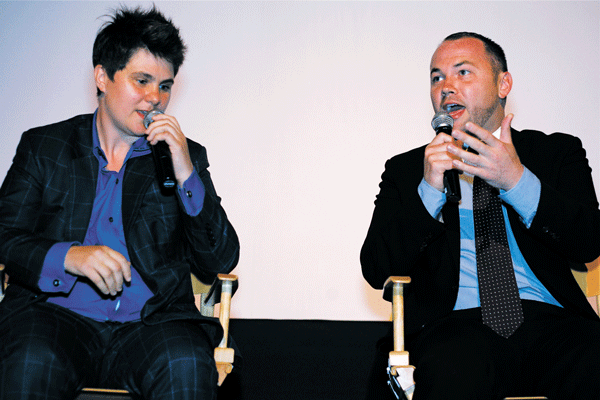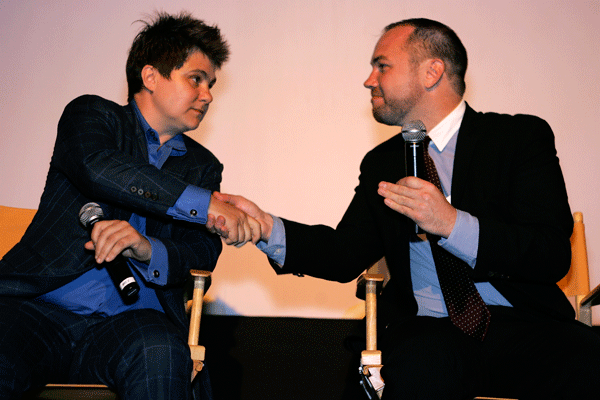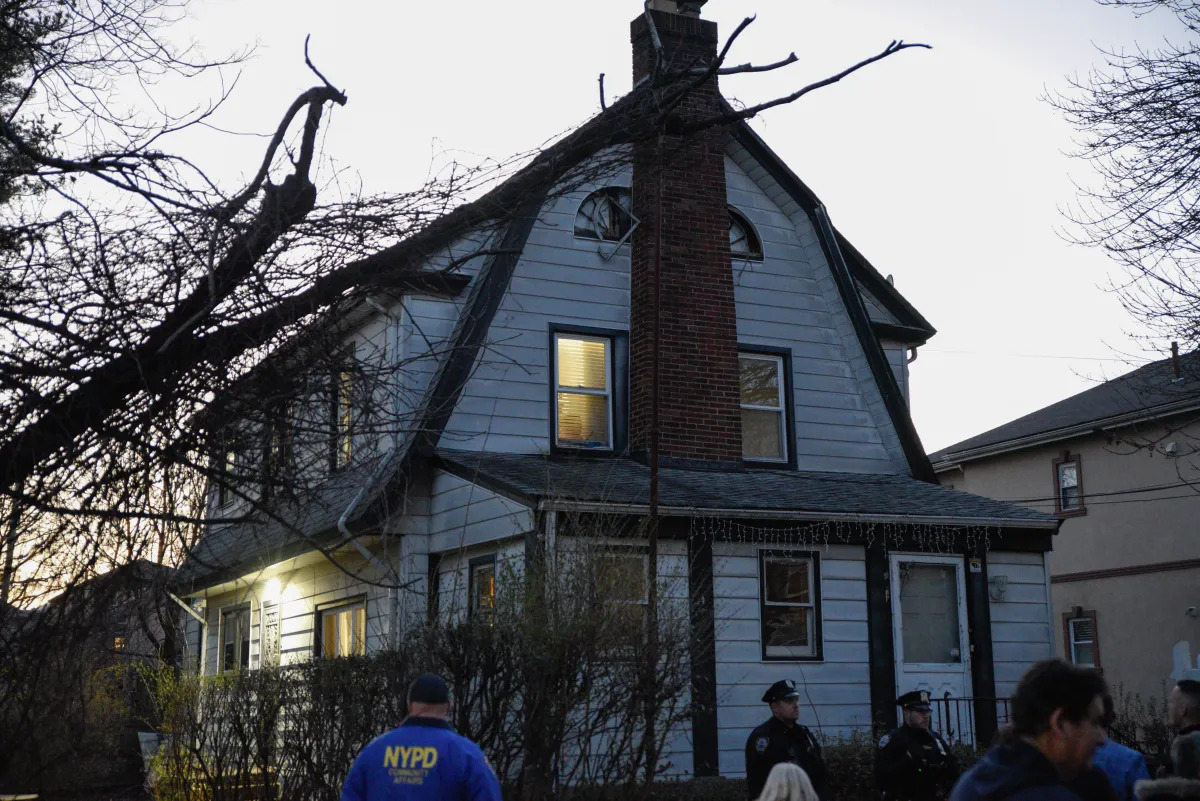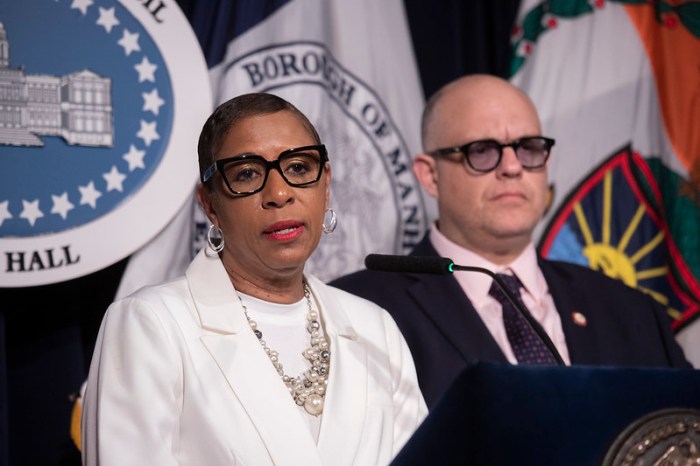BY SAM SPOKONY | For two people so ideologically similar in their fundamental concerns, the two Democratic candidates for the District 3 City Council seat have proven increasingly adept at getting under one another’s skin.
Corey Johnson, the current and twice-elected chairperson of Community Board 4, and Yetta Kurland, a civil rights attorney and activist, each traded verbal jabs and concrete proposals during their debate on Aug. 26, at the Chelsea Bow Tie Cinemas on W. 23rd St.
The event, which was sponsored by NYC Community Media (the publisher of The Villager and the East Villager), marked one of the last, if not the final, face-to-face showdowns between the two candidates before the primary election on Tues., Sept. 10. The debate was co-moderated by Lincoln Anderson, editor of The Villager, and Paul Schindler, editor of Gay City News.
The result of the primary will effectively decide the winner of the District 3 seat, which has been held for the past 14 years by Council Speaker Christine Quinn, and which spans from 55th St. to Canal St. and from Fifth Ave. to the Hudson River.
But beyond that sense of urgency, the explosive atmosphere of Monday evening’s debate — which featured an audience of extremely vocal supporters on both sides (but particularly Johnson’s) — was fueled primarily by pointed and, at times, personal attacks that have become a constant feature in this tense race.

Yetta Kurland, left, and Corey Johnson verbally sparred during Monday night’s District 1 debate.
RESTORING A HOSPITAL
Asked what would be the top issues they would focus on, both Johnson and Kurland led off by declaring that their first priority, if elected, would be to work toward restoring a full-service hospital to the district, since so many Lower West Side residents feel that their healthcare needs have been neglected following the closing of St. Vincent’s Hospital.
Kurland has long made the hospital issue a centerpiece of her campaign by touting her strong leadership in the fight against St. Vincent’s demise, while also claiming that a lawsuit she filed — with the support of the Coalition for a New Village Hospital — succeeded in forcing the state’s Department of Health “to admit it had a legal obligation to restore a hospital at the site of St. Vincent’s Hospital.”
Assemblymember Richard Gottfried, chairperson of the Assembly Health Committee, attended the debate, and afterward told The Villager that Kurland’s claim that the state Health Department had admitted any such thing was “horses—t!”
Kurland claimed, again misleadingly, this is why North Shore-Long Island Jewish Health System is creating a $110 million emergency medical facility across the street from the new housing.
At the Aug. 26 debate, Kurland continued to push her plan to turn the free-standing E.R. into a more hefty 200-bed, full-service hospital.
“The coalition I’ve worked with on this has had engineers come in to analyze the site, and they said they could add four to six floors to that building for the same or similar cost,” she said. “That would be a good stepping stone, a good first step for our community, and it would save lives.”
But when pressed later on in the debate, Kurland balked on committing to being able to get a project like that underway within her first term on the Council, instead simply repeating that it would be a “number one priority.”
Johnson, on the other hand, did commit to being able to get started on a bigger hospital within his first term. However, he, like Kurland, said that in the end, he doesn’t care where within the district that hospital is eventually built, as long as it gets done.
Johnson expressed interest in what he called a “creative plan” that is being talked about within the community to look at the St. John’s Center building — at Houston St. and the West Side Highway — as a potential site for a full-service hospital.
“It would still be a good location for the community,” Johnson said, “and I’ve been told that the folks who own that building are open to discussing it.”
Even though their attitudes toward the need for a hospital are nearly identical, Kurland chose to attack Johnson’s record regarding activism at St. Vincent’s.
At one point, when Johnson spoke about his vehement opposition to Speaker Quinn’s support of the Rudin plan before the hospital’s closure, Kurland called him out for allegedly jumping on the bandwagon too late in the game.
“For Corey to say that he opposed the St. Vincent’s closure by testifying at a City Council hearing that took place two-and-a-half years after the hospital closed…I think we really want to see people standing up before that,” she said.
That remark prompted some audience members to aggressively shout Kurland down, with one even telling her, “Shut up!”
Johnson responded by acknowledging his opponent’s well-known leadership on the issue, while stressing that he had, in fact, been there during the struggle.
“Yetta, you did a great job with regard to St. Vincent’s,” he said. “And I will work with you on that issue whether or not I’m elected. But I was at those community meetings [to fight against the hospital’s closure]. I wasn’t up front leading them — you were. And you did great work. A lot of people did a lot of work and pitched in to that effort. But for you to try to hurtfully say this…I think we need to stop blaming people like that. It’s not the way to move forward.”
AFFORDABLE HOUSING
Both candidates stated that a fight for new affordable housing in the district would be another top priority if elected.
Johnson, who has served on C.B. 4 since 2005, has promoted his work with the board on affordable housing as one of the key aspects of his personal record.
In particular, he had stressed at a previous debate on Aug. 22 (sponsored by the L.G.B.T. advocacy group FIERCE) that, under his leadership, C.B. 4 was able to partner with elected officials and agency officials to succeed in creating 139 units of affordable housing at a new building at W. 29th St. and 10th Ave., which will be opening this fall. Those units — of which 70 percent will house artists, 15 percent seniors and 15 percent C.B. 4 residents — were restored to the community by transferring former Section 8 housing units (which were no longer being provided to low-income tenants) from Manhattan Plaza, an artists housing development on W. 43rd Street.
“During my time on the community board, the number one issue we’ve pushed is building affordable housing,” Johnson said at the Aug. 22 debate. “And I can’t say that we’ve built enough, but we’ve done our best, and I’m going to keep fighting for that.”
At NYC Community Media’s Aug. 26 debate, Johnson reiterated his belief that the city should stop relying so heavily on the state-level 421a program — more commonly known as the “80/20” program — which provides a tax abatement for developers who put up a residential building with 20 percent affordable housing.
“The city should be investing public dollars into real affordable housing, like Westbeth [in the West Village] and Penn South [in Chelsea],” he said.
Kurland took every opportunity at the Aug. 26 debate to undercut her opponent’s statements on the issue, claiming that he just “talks a good game” when it comes to affordable housing and standing up to big developers. She stated, at various times during the debate that big development projects like Hudson Yards (of which only 5,000 out of 20,000 residential units will be affordable), the Chelsea Market vertical expansion and others were basically unaffected by Johnson’s personal opposition.
“Every single one of those plans has been approved by the community board that Corey Johnson chairs,” she said.
Kurland, however, did not provide any concrete plans to create affordable housing, and instead said that her work as a tenants’ rights attorney has given her experience in protecting S.R.O. (single-room occupancy) and low-income tenants against conniving landlords.

Yetta Kurland, left, and Corey Johnson verbally sparred during Monday night’s District 1 debate.
KURLAND KEEPS UP ATTACK
The issue of real estate interests is one that has led to some of the most heated exchanges in this race, as Kurland continues to portray Johnson as having suspect ties to big developers. Her efforts to do that figured heavily into the Aug. 26 debate — perhaps at the expense of her ability to present her own ideas within the time allotted by the moderators.
Specifically, Kurland attempted to publicly shame Johnson for his past job at GFI Development Company, and his current part-time work for the Sydell Group, both of which are New York-based developers.
“The real question is,” Kurland claimed, referring to her opponent, “are you going to elect the person who the political insiders and the special interests are going to feel most comfortable with?”
Although he did not choose to publicly disclose his past and current employment as part of his candidacy until it was revealed by a political Web site (citycouncilwatch.net) and then pounced upon by Kurland, Johnson has not backed down from those pointed questions of his political integrity.
At Monday’s debate, as in previous forums, Johnson instead sought to spend time actually providing detailed answers to the moderators’ questions, as well as trying to punch holes in what he termed her “distortion” of his character. However, Johnson was forced to address the issue head-on several times — especially when, as part of the rules of the debate, Kurland chose to ask him a question about his work for the developers.
“I’m not ashamed of what I’ve done, because I didn’t do anything wrong,” Johnson said, claiming that he has done community outreach and marketing work for the developers, rather than engaging in the kind of coldhearted tenant displacement of which Kurland has often implicitly accused him. “You continue to say I’m a real estate executive, tied to real estate interests, and that’s simply not true,” he answered. “I make $52,000 a year, I live in a 300-square-foot studio apartment and I grew up in public housing [in Massachusetts].”
Johnson eventually launched a jab of his own at Kurland, by taking an opportunity to ask her about the handgun she was once licensed to use when she owned an English language school at 23rd St. and Park Ave. South, and served as the school’s designated “gun custodian,” as she has put it previously.
Kurland has said that, after she sold the school, she gave up the gun. At the Aug. 22 debate, Johnson queried her on how she disposed of the gun, and if it was done in a legal and acceptable way.
At that debate, Kurland seemed uncomfortable talking about the disposal of the gun, and stumbled a bit in her answer before saying simply that it was disposed of “in accordance with N.Y.P.D. policy and procedures.”
But she lashed out at Johnson when he broached the issue again on Aug. 26, calling his question about the gun a “despicable” example of “gotcha politics.” Adding that she fully supports strict gun-control legislation (as does Johnson), Kurland once again stated that her gun had been turned in to the New York Police Department in a legal manner.
SCHOOL OVERCROWDING
Johnson stressed that one of his top priorities, if elected, would be to focus on building more schools within the district to combat the rampant overcrowding that has taken hold in many West Side classrooms. He expressed hope regarding the forthcoming middle school at 75 Morton St., as well as the Foundling School, a new elementary school on W. 16th St., but pledged to support other existing local schools to make sure they have adequate resources.
Johnson pointed specifically to work he did with C.B. 4 to help provide a new school facility to P.S. 51, on W. 45th St., which will nearly double the capacity of that school.
“But there is still an overcrowding crisis, and we have to keep fighting for new schools,” he said.
Kurland said that education is very important to her because she is an “educator,” and acknowledged the overcrowding issue, but didn’t provide any concrete plans to tackle it. She mentioned the concept of inclusionary zoning, which she said could be used to require developers to build schools and affordable housing in new development — but instead of pursuing that along an education standpoint, she launched into another attack on Johnson’s affordable housing record.
PIER 40, AIR RIGHTS
Both Johnson and Kurland showed a commitment to maintaining Hudson River Park — and especially the ailing Pier 40, at W. Houston St. The park, operated by the Hudson River Park Trust, has been struggling financially amid diminishing funding from the city and state. But Kurland was much more optimistic about being able to salvage Pier 40 — a beloved public space for many locals, especially for its ballfields — without opening up the pier for revenue-generating development, or selling air rights from the park’s commercial piers for use for development on the other side of the highway.
“Before we make that quick move, I’d like to see if we can come up with other sources of revenue,” Kurland said, adding that she would try to work with the state to get matching funds to support the Trust. In addition, she proposed an audit of the Trust, in order to make sure its funds are being spent effectively.
Johnson took what could either be described as a more pessimistic or a more realistic view of the situation, depending on one’s perspective.
“The Hudson River Park Trust is going to put out an R.F.P. [request for proposals] at some point, and we have to make sure that any development on Pier 40 is done in a community-minded way,” he said, adding, “There are going to be air rights sold — it’s going to happen, but we just need to be careful about how it happens. It can happen just east of the park at Pier 76, or it can happen just east of the park at Pier 40, and we have to make sure that when those air rights are sold, that it goes through the public approval process, the ULURP [Uniform Land Use Review Procedure], in a way that actually works.”
BUDGET, BIKE-SHARE, POLICE…
Both candidates expressed great interest in implementing participatory budgeting within the district. That practice, which is currently used by a handful of city councilmembers, allows local residents and other stakeholders to have a say in how some of the budget funds for their district are spent.
Johnson called it “incredibly exciting,” while Kurland said that it helps elected officials remember that “it’s not their money, it’s your money, and they should use it wisely.”
Both candidates also said they support the new Citi Bike program over all, although they expressed concerns about safety issues related to lack of enforcement when it comes to the many cyclists who don’t obey the rules of the road. They both added that some of the bike-share docking stations have been poorly placed within the district — blocking buildings, and in some cases making it difficult for emergency vehicles to access entrances — and that the city should be gathering more community input on the placement of those stations.
At the Aug. 22 FIERCE debate, both Johnson and Kurland railed against the N.Y.P.D. stop-and-frisk program (which was recently ruled unconstitutional) and both fully supported the City Council’s recent override of Mayor Bloomberg’s veto on new legislation that will reform Police Department oversight to prevent future incidences of racial profiling
But there was some disagreement between the two candidates regarding police approaches to overall public safety, particularly in the West Village, considering that the Aug. 22 debate was held on Christopher St. Johnson said he would not support an increase of police officers on patrol as a response to street violence, and would instead favor an approach based on increased communication with the local precinct, in order to prevent new problems — particularly resulting from potentially bad interactions between officers and young people of color.
Kurland, on the other hand, said that she fully supports the community policing initiatives that were associated with former Mayor David Dinkins, and that more cops can be effectively put on patrol to combat neighborhood violence, as long as those officers are trained to be properly receptive and responsive to the needs of the community.

















